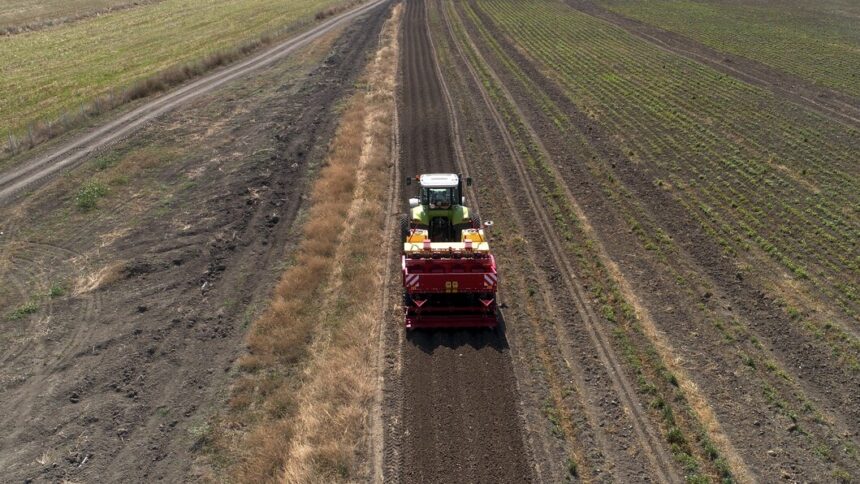As agriculture faces increasing pressure from climate change, soil degradation, and the demand for higher productivity, innovative farming practices are becoming essential. One such practice gaining attention is Controlled Traffic Farming (CTF). This method can help South African farmers enhance soil health, increase yields, and improve overall efficiency. Here’s a comprehensive look at CTF and how it can benefit your farming operations.
What is Controlled Traffic Farming?
Controlled Traffic Farming is an agricultural practice that involves restricting the movement of vehicles and machinery to specific lanes or tracks in the field. This approach minimizes soil compaction, preserves soil structure, and improves water infiltration and crop growth. In a CTF system, all field operations—planting, cultivating, and harvesting—are conducted using the same traffic lanes, leaving the rest of the field undisturbed.
Benefits of Controlled Traffic Farming
- Reduced Soil Compaction One of the primary advantages of CTF is the reduction of soil compaction. Traditional farming practices often lead to compacted soil due to the repeated movement of heavy machinery across the field. Compacted soil can hinder root development, reduce water infiltration, and limit nutrient uptake. By confining traffic to specific lanes, CTF helps maintain healthy soil structure, promoting better crop growth.
- Improved Soil Health With less compaction and disturbance, the soil ecosystem can thrive. Beneficial microorganisms and earthworms can flourish in undisturbed soil, enhancing nutrient cycling and overall soil fertility. Healthy soil leads to improved crop yields and resilience against pests and diseases.
- Enhanced Water Management CTF promotes better water infiltration and retention. By reducing compaction, water can penetrate the soil more effectively, reducing runoff and erosion. This is especially beneficial in South Africa, where water scarcity is a significant concern. Improved water management can lead to better drought resilience and more consistent crop production.
- Increased Efficiency Implementing CTF can lead to more efficient use of machinery and labor. By standardizing traffic patterns, farmers can optimize field operations, reducing the time and fuel required for planting, cultivating, and harvesting. This efficiency translates to lower operating costs and increased profitability.
- Better Crop Performance Healthier soil and improved water management contribute to better crop performance. Studies have shown that CTF can lead to higher yields and improved quality of produce. With consistent growth conditions, farmers can expect more reliable harvests and better returns on their investments.
Implementing Controlled Traffic Farming
- Assess Your Current Practices Before transitioning to CTF, evaluate your current farming practices and identify areas for improvement. Understand the traffic patterns of your machinery and consider how CTF can fit into your existing operations.
- Plan Traffic Lanes Designate specific traffic lanes for your machinery and ensure that these lanes are consistent across all field operations. The width of the lanes should accommodate your equipment while leaving ample undisturbed areas for crop growth.
- Use Appropriate Machinery Invest in equipment that is compatible with CTF. This may involve using narrower machinery or adjusting existing equipment to fit the designated traffic lanes. Ensure that all machinery is well-maintained to minimize the risk of soil disturbance.
- Monitor and Adjust As you implement CTF, regularly monitor soil health, crop performance, and overall efficiency. Be prepared to make adjustments as needed to optimize your system. Gathering data on yields, water usage, and soil conditions will help you refine your practices over time.
- Educate and Train Staff Ensure that your farm staff is well-informed about the principles and practices of CTF. Provide training on operating machinery within the designated traffic lanes and emphasize the importance of minimizing soil disturbance.
Controlled Traffic Farming offers South African farmers a sustainable solution to enhance soil health, improve water management, and increase crop yields. By minimizing soil compaction and preserving soil structure, CTF can lead to a more productive and resilient farming operation. As the agricultural sector continues to evolve, embracing innovative practices like CTF will be crucial for ensuring long-term success and sustainability in South Africa’s dynamic agricultural landscape.
Join 'Farmers Mag' WhatsApp Channel
Get the latest Farming news and tips delivered straight to your WhatsApp
CLICK HERE TO JOIN






